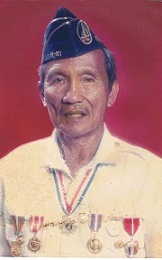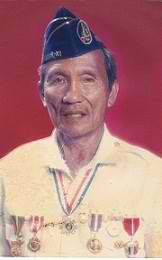BY TESSA JAMANDRE
 DAVAO.— Sixty-five years ago today, Juan Pascual was hiding in a foxhole in Guianga town, south of this province. He had been there for days as double-bodied planes of the Americans were shelling the abaca farm he was tending, clearing the area of the remaining Japanese forces that have already announced unconditional surrender two days before.
DAVAO.— Sixty-five years ago today, Juan Pascual was hiding in a foxhole in Guianga town, south of this province. He had been there for days as double-bodied planes of the Americans were shelling the abaca farm he was tending, clearing the area of the remaining Japanese forces that have already announced unconditional surrender two days before.
He was in there with a tiny bird that he had set free after the skies cleared of smoke and the air of gunshots. The flight of the bird signaled the end of the war but not his torment. Pascual for the second time became a prisoner of war, no longer by the aggressor—the Japanese—but by the liberators, the Americans.
Pascual was believed to be a “collaborator” and thus was denied his claim to the one-time lump-sum grant of the US for Filipino veterans. Pascual is among the 1,058 who received a notice of denial from the US Department of Veterans Affairs.
A total of 36,452 eligible veterans’ claims worth over P9 billion have been processed since the passage of the American Recovery and Reinvestment Act in February 2009. It provided $67 million in additional funding for the Filipino Veterans Equity Compensation (FVEC) fund that will pay eligible U.S. citizen Filipino World War ll veterans a one-time payment of $15,000 and $9,000 for Filipino veterans who are living in the Philippines on top of their other payments and benefits.
The Department of Veterans Affairs allocates some $8 million for the continuing benefits of Filipino war veterans and their beneficiaries. In July this year, President Barack Obama provided additional benefits amounting to up to $67 million as part of the Supplemental Appropriations Act of 2010. It would add to the $198 million worth of benefits which were earlier granted under the American Recovery and Reinvestment Act of 2009.
As of April 2010, a total of 41,302 applications have been received, 6,884 (16.6 percent) of which were granted to Filipino veterans based in the Philippines, while 7,075 (17.1 percent) applications were approved for those veterans in the United States. Completed applications are recorded at 25,276 (61 percent).
The US Embassy in Manila said the remaining 4,832 claims will be completed soon. But the Veterans Affairs Manila Regional Office has received more than 1,058 Notices of Denial. A total of 11,317 (27 percent) claims have been denied; Pascual is one of them. He fought side by side with the Americans during the war, and was even abandoned by them when they were losing against the Japanese yet he stuck it out with Filipino fighters until his capture by the Japanese. He became a prisoner of war (POW) from May 9, 1942 to October 1943.
Recalling their defense of the Digos line that pushed back the Japanese forces that were preparing to repel an assault from the sea, Pascual said the two American officers leading them, a certain Major Baldwin and a Captain McGay, abandoned them when they were running out ammunition. But Pascual said the Filipinos never left their position.
“It hurts because they were the ones who were supervising us and in some occasions left us fighting alone, yet it took 80 long years for our services to be recognized as a service to the US government,” Pascual said, lamenting that his application for the veterans equity compensation fund has been denied. Turning 94 last July, he continues to appeal the denial.
Eligible veterans are those who served before July 1, 1946, in the organized military forces of the Government of the Commonwealth of the Philippines, while such forces were in the service of the Armed Forces of the United States. Pascual volunteered and underwent military training from July to December 1938. He received special orders to report for active duty on Nov. 24, 1941. He was part of the battalion inducted into the United States Armed Forces in the Far East on that day.
However, according to the US Embassy, every claim for benefits requires a loyalty clearance to determine if the claimant collaborated with the enemy. The Veterans Affairs is required to gather additional information to determine if this specific individual was or was not involved in assisting the Japanese. Pascual worked with the Japanese before the war and during the war out of the need to survive and against his will.
Shortly after his military training in 1938, Pascual worked at the Furukawa Company trading abaca hemp. He learned how to use the abacus from the Japanese where he was an office boy before he was inducted to the USAFFE. He returned to work for at the same company shortly after his release as prisoner of war of the Japanese. But it was never the same again. Already marked as a soldier, he got numerous beatings at the company that once taught him how to count. Until one day, two Japanese soldiers picked him up from Furukawa Company and brought him to the Bureau of Constabulary where he was forced to work as economic police of the Japanese for six months.
“It was there that I accompanied Japanese soldiers when they went on patrols to round up those suspected to be connected with the guerrillas. That was against my will and I resented that because it gave me a bad name (among members of) the guerrilla movement (who have) seen (me) with Japanese soldiers roaming the mountainside of Sta. Cruz,” Pascual said. He added that working for the BC earned him the tag “collaborator” which became the basis for the denial of his claim for the FVEC.
Pascual said he suffered much in the hands of the Japanese for being a soldier of the USAFFE during the war. Eighteen long months in the concentration camp had been too much to bear he said. Two days under the sun, lined up to face a firing squad of three machine guns—even that he wholeheartedly accepted because of “my love for freedom and democracy and, above all, love of country.”
But when he emerged from that foxhole 65 years ago today and landed in jail as POW of the Americans for three months, Pascual feels he remains a POW to this day for being wrongfully tagged as “collaborator.” The war has long ended but for him the fight to prove he did not betray his country during the war has just begun.
